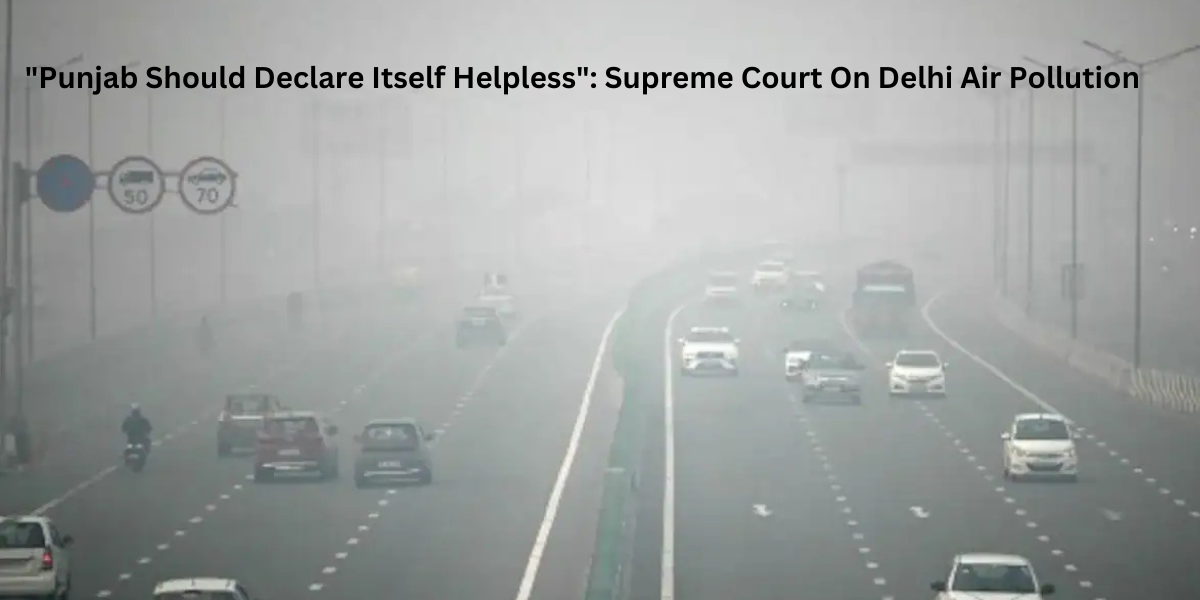In a stern rebuke of the Punjab and Haryana governments, the Supreme Court has expressed frustration over their lack of action in addressing the deteriorating air quality in Delhi and the National Capital Region (NCR). As the region faces predictably worsening pollution levels, the court highlighted the failure of these states to comply with its June 2021 orders to prosecute violators of anti-pollution laws, particularly those engaged in the burning of stubble and agricultural waste.
The court’s remarks came during a recent hearing where it referred to the Commission for Air Quality Management (CAQM)—a central government panel—as a “toothless wonder” that has failed to enforce its own directives. Justice Abhay S Oka, along with Justices AG Masih and A Amanullah, pointed out that despite the clear orders from the CAQM, there has been little to no prosecution of offenders, with only nominal fines being imposed.
Calls for Accountability
During the proceedings, Justice Oka challenged the Punjab government to declare its helplessness in addressing the pollution crisis. “Let them declare ‘we cannot do anything… we are helpless,'” he said, underscoring the government’s inaction in the face of multiple violations. The court specifically criticized Punjab and Haryana for failing to prosecute nearly 200 recorded cases of farm fires, instead opting for minimal financial penalties that do little to deter future violations.
The court’s anger was palpable as it demanded explanations for the lack of prosecution, asking, “Why is there no prosecution for violation of orders? This is not a political issue… it is about implementation of statutory directions by CAQM.” The justices indicated they were prepared to take punitive action against CAQM officers if necessary to spur compliance and enforcement.
The Role of Technology in Tracking Violations
The Supreme Court emphasized that states were provided detailed data from the Indian Space Research Organisation regarding the locations and sizes of fires caused by stubble burning. Justice Oka remarked, “So you cannot say locations were not found… but nobody is going to prosecute, nobody is going to take action.” This statement highlights the glaring disconnect between the availability of information and the actual enforcement of laws.
Immediate Actions Required
The court set a one-week deadline for the prosecution of pollution law violators, calling out the reluctance of state governments to take necessary actions. Justice Oka questioned whether the halt or delay in prosecutions was influenced by external pressures, hinting at the possibility of political interference. “We will issue summons to them also. What is this hesitation in prosecuting people?” he asked, pressing for accountability.
Seasonal Pollution in Delhi
As winter approaches, the air quality in Delhi typically declines, often reaching hazardous levels. The city has already begun experiencing poor air quality, with the Air Quality Index (AQI) reaching 207, classified as ‘poor.’ In response, the government activated the first phase of its Graded Response Action Plan, which includes stringent measures such as enhanced vehicle checks, stricter emission controls for industries, and a ban on open waste burning.
Historically, the onset of winter has brought with it a surge in respiratory illnesses, exacerbated by the pollution caused by stubble burning, vehicle emissions, and industrial discharges. The Supreme Court’s concerns are especially pertinent given the annual spike in air pollution levels during Diwali, leading to emergency measures like the ban on firecrackers to mitigate the situation.
You May Also Like!
- Indian Army Ordnance Corps (AOC) Recruitment 2024: Apply Now for 723 Posts
- CBSE Class X and XII Date Sheet for Board Examinations PDF – 2025
- Android 16 Developer Preview 1: Key Features, Timeline, and Eligible Devices
- Netflix to Launch “Squid Game: Unleashed” Mobile Game on December 17, 2024
- JEE Main 2025 Application Forms Released: Direct Link Apply Now
The Need for Coordinated Efforts
The court’s frustration is compounded by the observation that despite the existence of regulatory frameworks and plans, execution remains severely lacking. The CAQM has been criticized for its “total non-compliance” with the law, as evidenced by its infrequent meetings and inaction on critical directives. The justices challenged the CAQM to demonstrate any concrete steps taken to combat pollution, highlighting the need for a robust and coordinated approach among government agencies.
Conclusion
As Delhi braces for the impending seasonal pollution crisis, the Supreme Court’s stern warnings serve as a wake-up call to the Punjab and Haryana governments. The failure to enforce anti-pollution laws not only compromises public health but also highlights a broader issue of governance and accountability in managing environmental crises. With the court setting a clear deadline for action, the onus is now on state authorities to demonstrate a commitment to tackling the air quality crisis head-on, moving beyond discussions to tangible enforcement of laws.
The stakes are high, as millions of residents in Delhi and the NCR face the health risks associated with deteriorating air quality. The need for effective policy implementation, accountability, and public health protection has never been more urgent. As the Supreme Court has made clear, the time for action is now.



